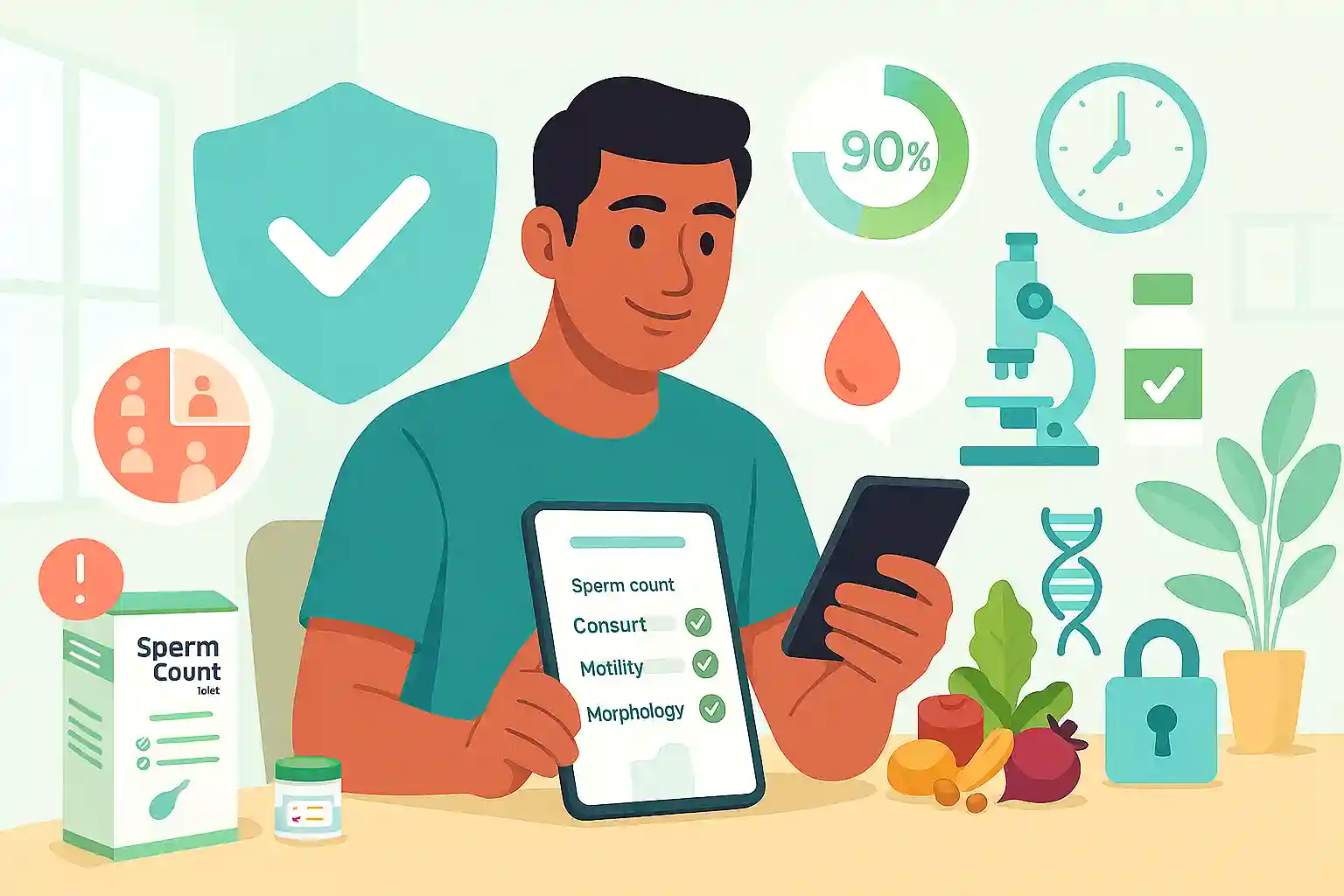Talking about fertility can be one of the most challenging conversations couples face. Whether you're just starting to try for a baby or have been struggling with conception for months, discussing sperm testing and male fertility often brings up feelings of vulnerability, anxiety, and even defensiveness. Yet these conversations are crucial for your journey toward parenthood and can actually strengthen your relationship when approached with care, understanding, and the right strategies.
Why These Conversations Matter
Open communication about fertility isn't just about logistics—it's about building a foundation of trust and partnership for one of life's most significant journeys. When couples avoid or struggle with these discussions, it can lead to misunderstandings, resentment, and unnecessary stress during an already emotional time.
Benefits of honest fertility conversations:
- Creates shared understanding of concerns, hopes, and expectations
- Reduces anxiety and uncertainty by establishing clear communication
- Helps both partners feel heard and supported
- Enables coordinated action and decision-making
- Strengthens emotional intimacy and partnership
- Prevents blame and promotes team approach to challenges
Research shows that male factor issues contribute to about 40-50% of infertility cases, making male fertility testing an essential part of any comprehensive fertility evaluation. Yet cultural stigmas and misconceptions often make men reluctant to discuss or pursue testing.
Understanding Common Concerns and Fears
Before starting these conversations, it's helpful to understand the common concerns both partners may have:
Common Male Concerns:
- Fear that fertility issues reflect on masculinity or sexual performance
- Worry about blame or judgment if results show problems
- Anxiety about the testing process and what it involves
- Concern about privacy and confidentiality
- Feeling pressure to 'perform' or feeling like the problem
- Worry about treatment options and their invasiveness
Common Female Concerns:
- How to bring up testing without seeming accusatory
- Fear of partner becoming defensive or shutting down
- Worry about damaging the relationship by pushing the topic
- Anxiety about what results might mean for their future
- Feeling responsible for managing the fertility journey
- Concern about timing and when to seek help
Setting the Stage for Productive Conversations
The context and approach of your conversation can significantly impact its success:
Choose the Right Time and Place:
- Pick a calm, private moment when you both have time to talk
- Avoid stressful periods, right before work, or during conflicts
- Choose a comfortable, neutral space where you both feel relaxed
- Turn off distractions like phones, TV, or computers
- Consider going for a walk or having the conversation during a peaceful activity
Set the Right Tone:
- Approach the conversation as teammates, not opponents
- Use 'we' language instead of 'you' language
- Express love and commitment before diving into concerns
- Acknowledge that this is a sensitive topic for both of you
- Be prepared to listen more than you speak
Conversation Starters That Work
How you begin the conversation sets the tone for everything that follows. Here are effective ways to start:
For Initial Fertility Discussions:
- "I've been thinking about our journey to start a family, and I'd love to talk about how we can support each other through this."
- "Can we talk about what we both expect as we try to conceive? I want to make sure we're on the same page."
- "I read that it's normal for conception to take time, but I'd feel more confident if we understood our baseline health. What are your thoughts?"
- "How are you feeling about our timeline for getting pregnant? I'd love to hear your perspective."
When Concerns Have Developed:
- "I've been feeling anxious about conception, and I think it would help both of us to get some information about our fertility. How do you feel about that?"
- "I know this might be a sensitive topic, but I've been wondering if we should talk to a doctor about our fertility. What are your thoughts?"
- "I love you and I'm committed to this journey with you. I think getting some baseline testing might help us feel more confident. Can we explore this together?"
Specifically About Male Testing:
- "I've learned that fertility testing for both partners is pretty standard now. Would you be open to us both getting checked so we have the full picture?"
- "Our doctor mentioned that comprehensive fertility evaluation includes testing for both of us. How do you feel about that?"
- "I think it would be really helpful if we both understood our fertility health. The male testing is actually pretty straightforward. Can we talk about it?"
Addressing Resistance and Concerns
It's normal for partners to have reservations about fertility testing. Here's how to address common forms of resistance:
"It's too early to worry about testing":
- Acknowledge their perspective: "I understand wanting to give it more time naturally."
- Share the facts: "Testing doesn't mean there's a problem—it just gives us information."
- Emphasize partnership: "Getting baseline information helps us make informed decisions together."
- Suggest compromise: "What if we agree on a timeline for trying naturally before considering testing?"
"The problem is probably with me anyway":
- Correct misconceptions: "Actually, male factors are involved in about half of all fertility challenges."
- Emphasize teamwork: "This isn't about finding blame—it's about understanding how we can work together."
- Share responsibility: "We're both part of this equation, and we both deserve to know our health status."
- Normalize testing: "Fertility testing for both partners is completely routine now."
"I don't want to masturbate in a clinic":
- Provide information: "Most clinics offer private, comfortable rooms and home collection options."
- Acknowledge feelings: "I understand that might feel awkward—it's a normal concern."
- Discuss alternatives: "Many places allow home collection and quick drop-off."
- Focus on the goal: "It's a brief moment that could give us valuable information for our future."
Making Testing Less Intimidating
Understanding what sperm testing actually involves can help reduce anxiety and resistance:
What Semen Analysis Testing Includes:
- Sperm count: Number of sperm per milliliter of semen
- Motility: How well sperm move and swim
- Morphology: Shape and structure of sperm
- Volume: Amount of semen produced
- pH and other chemical properties
- Presence of white blood cells or other abnormalities
The Testing Process:
- Simple, non-invasive procedure requiring a semen sample
- Can often be done at home with specific collection instructions
- Usually requires 2-5 days of abstinence beforehand
- Results typically available within a few days to a week
- May be repeated if initial results are abnormal
- No pain, needles, or invasive procedures involved
Supporting Each Other Through the Process
Once you've agreed to pursue testing, maintaining support and communication is crucial:
Before Testing:
- Research clinics and doctors together
- Understand insurance coverage and costs
- Discuss what you'll do with different types of results
- Plan something enjoyable to do after the appointment
- Remind each other that testing is information, not judgment
During the Testing Period:
- Follow pre-test instructions together (abstinence periods, lifestyle modifications)
- Offer emotional support without being pushy
- Maintain perspective that this is one step in your journey
- Continue with normal life and don't let testing consume your thoughts
- Check in with each other about feelings and concerns
Waiting for Results:
- Agree on how you'll receive and discuss results
- Plan to be together when results are available
- Avoid obsessing or trying to interpret preliminary information
- Maintain intimacy and connection during the waiting period
- Remember that most fertility issues have treatment options
Discussing Results Together
How you handle test results can significantly impact your relationship and next steps:
If Results Are Normal:
- Celebrate having good information about your health
- Discuss next steps in your fertility journey
- Consider whether female testing is also needed
- Use the information to guide timing and lifestyle choices
- Maintain realistic expectations about conception timelines
If Results Show Concerns:
- Process emotions together before making decisions
- Avoid blame and focus on solutions
- Seek clarification from medical professionals about what results mean
- Research treatment options together
- Consider counseling if needed to process the information
- Remember that many fertility issues are treatable
Key Communication Principles:
- Listen actively to your partner's concerns and feelings
- Validate emotions without trying to fix or minimize them
- Ask open-ended questions to understand their perspective
- Share your own feelings honestly and vulnerably
- Focus on 'we' solutions rather than 'you' problems
- Take breaks if discussions become too heated or emotional
Navigating Difficult Emotions
Fertility journeys often bring up intense emotions that can strain communication:
Common Emotional Challenges:
- Shame or embarrassment about fertility issues
- Guilt about potentially being the 'cause' of delays
- Anxiety about the future and treatment options
- Grief over lost expectations or timelines
- Anger or frustration with the process
- Fear about relationship impact
Supporting Each Other Emotionally:
- Acknowledge that all feelings are valid and normal
- Create space for both partners to express emotions
- Avoid trying to 'fix' your partner's feelings
- Offer physical comfort and emotional presence
- Remind each other of your love and commitment
- Consider professional counseling for additional support
When Conversations Aren't Working
Sometimes, despite best efforts, couples struggle to communicate effectively about fertility:
Warning Signs:
- Repeated arguments that don't resolve anything
- One partner consistently shutting down or avoiding discussions
- Blame, criticism, or defensiveness dominating conversations
- Feeling more distant or disconnected from each other
- Inability to make decisions or move forward together
- Significant emotional distress affecting daily life
Getting Additional Support:
- Consider couples counseling with a fertility-specialized therapist
- Join support groups for couples facing fertility challenges
- Consult with fertility counselors who understand these specific issues
- Take a temporary break from fertility discussions to reset
- Involve a trusted friend or family member as a neutral party
- Focus on rebuilding connection and intimacy first
Building Long-term Communication Skills
Fertility journeys can be lengthy, so developing strong communication skills serves your relationship beyond just testing decisions:
Ongoing Communication Strategies:
- Schedule regular check-ins about feelings and concerns
- Develop signals for when you need emotional support
- Create boundaries around when and how to discuss fertility
- Maintain aspects of your relationship unrelated to fertility
- Practice expressing needs clearly and specifically
- Learn to recognize and respect each other's coping styles
Protecting Your Relationship:
- Don't let fertility become your only topic of conversation
- Continue dating and enjoying activities together
- Maintain physical intimacy that isn't focused on conception
- Support each other's individual interests and friendships
- Celebrate small victories and positive moments
- Remember why you wanted to build a family together
Special Considerations and Scenarios
Different situations may require adapted communication approaches:
For Couples Who've Been Trying for a While:
- Acknowledge the emotional weight of time already invested
- Discuss any blame or resentment that may have built up
- Frame testing as gaining control rather than admitting failure
- Consider that both partners may be emotionally depleted
- Be extra gentle and patient with each other
For Second Marriages or Blended Families:
- Address any assumptions based on previous fertility experiences
- Discuss how fertility outcomes might affect existing children
- Consider different comfort levels with medical intervention
- Navigate potential family dynamics and outside opinions
- Clarify commitment levels to fertility treatments
For Couples with Cultural or Religious Considerations:
- Understand how cultural backgrounds might influence comfort with testing
- Discuss religious or cultural beliefs about fertility and intervention
- Navigate potential family pressure or expectations
- Find healthcare providers who respect your values
- Balance cultural traditions with medical recommendations
Moving Forward Together
Successfully navigating conversations about fertility and sperm testing can actually strengthen your relationship by building trust, communication skills, and emotional intimacy. The key is approaching these discussions as a team working toward a shared goal rather than adversaries in conflict.
Remember that fertility journeys are rarely linear or predictable. The communication skills you develop now will serve you throughout whatever path your journey takes—whether that includes further testing, treatments, or different family-building options.
Most importantly, don't lose sight of the love and partnership that brought you to this point. While fertility challenges can be stressful, many couples report that working through them together ultimately made their relationship stronger and more resilient.
Be patient with yourselves and each other. These conversations get easier with practice, and seeking support when you need it is a sign of strength, not weakness. Your commitment to open, honest communication about fertility is already a positive step toward building the family you both want.
References
- https://www.asrm.org/topics/topics-index/male-infertility/
- https://resolve.org/support/managing-stress-and-communication/
- https://www.ncbi.nlm.nih.gov/pmc/articles/PMC3341074/
- https://www.gottman.com/about/research/
- https://www.fertilityiq.com/male-factor-infertility
- https://pubmed.ncbi.nlm.nih.gov/32005113/
- https://www.sart.org/patients/a-patients-guide-to-assisted-reproductive-technology/
- https://www.mentalhealth.org.uk/explore-mental-health/mental-health-statistics/relationships-community-statistics
- https://journals.lww.com/psychosomaticmedicine/abstract/2005/05000/stress_and_reproductive_failure.14.aspx



